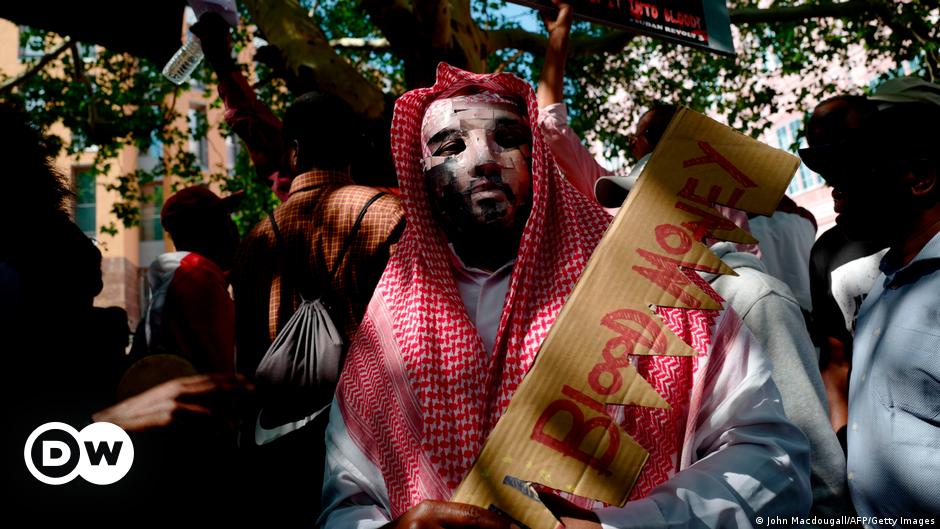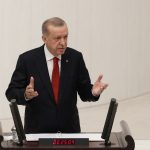There have been regular calls to boycott Saudi Arabia because of the country’s well-documented history of human rights abuses. But anyone trying to do that will have a hard time if they’re also trying to avoid the country’s international investments.
Over the past six years, these have increased substantially. Saudi Arabia’s sovereign wealth fund — that is, its state-owned investment fund — now holds shares in of all of the following companies: Amazon, Google, Visa, Microsoft, Disney, Nintendo, Uber, PayPal and Zoom, among many others.
It also owns the holiday company, Carnival, English Premier League football teamNewcastle United, a controversial professional golf tournament, and it has a significant relationship with BlackRock, the world’s largest asset manager. In fact, every time you buy a caramel mocha latte at Starbucks, or play the online game World of Warcraft, you are supporting Saudi investments, too.
Radical changes
The reason why Saudi Arabia has a stake in all of these well-known names is its Public Investment Fund, or PIF for short.
Most countries have sovereign wealth funds and Saudi Arabia is no exception. The PIF was first established in 1971, but up until relatively recently, the Saudi fund had mostly made low-key domestic investments and was not a big international player.
That all changed around 2015 when Saudi Arabia’s de facto ruler, Crown Prince Mohammed bin Salman, often simply called MBS, began to consolidate the kingdom’s wealth under his own name. MBS made the PIF central to his plans to modernize the country and diversify its economy away from oil.
In 2016, the fund first made global headlines for investing $3.5 billion (€3.1 billion) into ride-sharing company, Uber.
In 2019, Karen Young, a senior researcher at Columbia University’s Center on Global Energy Policy, noted that the PIF’s new role in the Saudi economy was “unprecedented” in a report for the Washington-based Project on Middle East Political Science.“It is the central engine of growth in the new Saudi Arabia, as envisioned by MBS. State resources are directed to feed the PIF and state assets are being sold to raise cash for the PIF.”
Besides giving MBS a way to change things fast and make money quickly, the PIF also provides the Saudi prince with “a very strong hand against internal dissent or alternative ideas about the appropriate role of private enterprise,” Young argued in the 2019 report.
Major ambitions
According to the fund’s publicity materials, the ultimate goal is for the PIF to become the largest and “most impactful” sovereign wealth fund in the world by 2030, with assets worth $2 trillion. It currently has around $608 billion, more than four times as much as it had back in 2015.
Norway’s sovereign wealth fund, which manages assets worth $1.4 trillion is the largest in the world right now and the PIF currently sits at number six.

In 2018, the PIF invested $45 billion (€47 billion) in the SoftBank Vision Fund, the world’s largest tech fund
But the PIF’s prospects of climbing those rankings look good. Thanks to the global energy crisis caused by the Russian invasion of Ukraine, oil prices have increased substantially. As a result Saudi Arabia, the second-biggest oil producer in the world, expects a budget surplus for the first time in 10 years and will likely be able to pump even more money into the PIF.
But as the PIF, and the authoritarian leader behind it, become ever more powerful, some observers are getting worried. Does all that international investment equal political power? Will Saudi Arabia use the PIF to buy support for its own foreign policy goals?
Dirty money?
Late last year, Amnesty International expressed concern about the Saudi Arabian takeover of Newcastle United, seeing it as a way of “sportswashing” away human rights abuses. Critics have said the same about the LIV Golf tournaments, and recent Formula One motor races in Saudi Arabia.
Questions were also asked about whether the PIF — a large, albeit indirect, investor in Twitter (it owns shares via another Saudi company) — had any influence on the way the social media company handled a 2015 Saudi spying scandal. Twitter has denied investors have any influence on its daily operations.
Saudi Arabia, through the PIF and other funds it invests in, like Japan’s SoftBank, has also put billions into the US tech scene. And as Kara Swisher, a US journalist and expert on the scene, has argued, “if you remove the Saudis from the worldwide global network, everything collapses.”
The PIF recently opened its books to investors but many of its purchases are not transparent, researchers say. In 2019, the PIF didn’t appear to have major direct investments in Europe, or Germany, a research paper from the German Institute for International and Security Affairs, or SWP, reported.
That may be changing. Columbia University’s Young, who is now working on a book about sovereign wealth funds in Gulf states, told DW that recently Gulf sovereign wealth funds have been eyeing investments in Greece “for defense rationales” and in Germany for energy deals.
“Should the PIF expand its investment activities in Europe, a political impact assessment could become necessary in view of the close link between the fund and the Saudi government,” the 2019 SWP report cautioned. “An assessment would have to be made as to whether the PIF exclusively acts as a profit-seeking investor or whether it pursues a foreign policy agenda.”
In it for the profit
Right now, the PIF is still acting mostly as a profit-seeking investor, Young said. “It is really a domestic tool for local investment and transformation of the Saudi economy.”
It is feasible, she agreed, that the PIF could eventually become more political, but, she argued, “right now, the priority is domestic growth, job creation and stability in Saudi Arabia.”
It’s a different story when it comes to regional investments though, Young and other experts said. The Gulf states, including Saudi Arabia, have been competing for economic influence in countries like Egypt for years. This contest has accelerated recently as cash-strapped countries like Egypt and Turkey struggle through serious economic problems and debt. Their far wealthier neighbors from the Gulf have taken to shopping for bargains to invest in, part of what the UK’s Financial Times describes as a “shopping spree.”
“Riyadh is pushing Egypt to sell the family silver,” said Stephan Roll, head of the Middle East and Africa division at SWP, referring to lucrative state-owned enterprises or Egyptian government shares in profitable private companies. “It has been reported in recent weeks that the SEIC [the newly established Saudi Egyptian Investment Co, owned by the PIF] has bought, or invested in, Egyptian companies. But this is not entirely transparent. Egyptian civil society views this development with concern and asks whether their country is being sold out,” Roll explained.

Shares in the Saudi oil company, Aramco, worth $80 billion (€83 bilion), were moved to the PIF earlier this year
But he, too, believes that right now the Saudis, at least, “are less concerned with political influence than with using their position to get favorable bargains.”
“These shopping sprees after a cycle of boom in the oil markets are not surprising,” added Sara Bazoobandi, an associate at the Hamburg-based GIGA Institute of Middle East Studies. “And it is important to note that one of the most common motivations for these funds is still maximizing [financial] returns.”
On the other hand, she added, “every investment is also the pursuit of some kind of interest on the part of the investor. And if the investor is a government, there may well be ‘non-financial’ interests involved too.”
Edited by: Nicole Goebel
Source: DW





